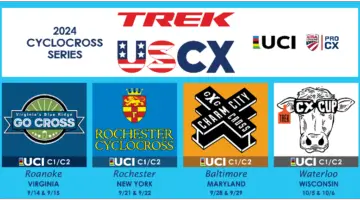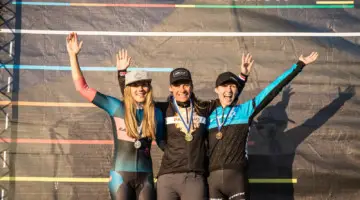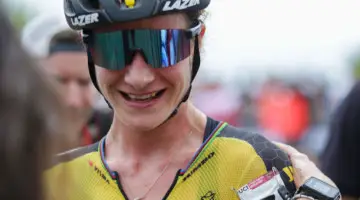When Chicago-based Lindsay Knight packed up to travel to the three-day Jingle Cross Cyclocross Festival, the Cat 2 racer was hoping to mix it up in the mud with Helen Wyman and other pros in the UCI C2 Women’s race Friday night, and contest the Women’s Open 1/2 races on Saturday and Sunday.
Mixing it up with race announcers and contesting their commentary were not in her Iowa City plans.
Yet on Sunday, the Ph.D. in Political Science found herself offering up a timely dissertation on how announcers can abuse the power of a microphone to offend racers and fans.
We also reached out to Knight for a brief interview, and have that in Part 2 of our reporting below.
(We have also reached out Larry Longo for a comment, but have not heard back yet.)
Have a take on the issue or personal experience at a bike race you’d like to share? Drop it in the comments below.
Cyclocross Magazine: The announcer at the Jingle Cross weekend said a number of offensive things as you reported in your social media post. What is the best-case scenario of your post?
Lindsay Knight: Best-case scenario is that they issue a public apology to the women’s fields that raced this past weekend, [including] juniors, amateurs, UCI, and formally state that they will not hire the announcer in question for any events in the future.
CXM: Do you believe all race promoters should not hire these announcers in the future, or do you hope such a mindset can be addressed through some type of training or education?
LK: No, I don’t think they should be rehired. Especially in this case, as one of the two promoters actually called out the inappropriateness of the other’s comments, albeit in private and ineffectively, and the individual did not stop, tone down, or apologize for his insulting and casual misogyny. Education is effective when people can admit shortcomings or blind spots and learn from them—education is less effective when individuals with discriminatory perspectives think of themselves as privileged and powerful enough to get away with that BS.
CXM: You tagged USA Cycling in your post. Do you think the governing body has a responsibility to vet or ban, race announcers?
LK: I think USA Cycling has the responsibility to know what’s going on at its sanctioned events. I’ve spoken with USA Cycling, and they’ve also assured me that the announcer in question will not be hired for National-level races by their Events Services team.
CXM: Such comments are tone deaf, especially these days. What feedback do you have for the announcer [Larry Longo] in question?
LK: These comments weren’t tone deaf—they were misogynistic. And frankly, with the past week of political debate and discourse around the Supreme Court hearings, I sincerely do not know how any sentient adult in this country, male or female, can plead ignorance over comments that are meant to degrade and objectify women. The comments weren’t innocent and misunderstood, they were said with the intent to demean and make the women athletes in those fields feel lesser.
CXM: If the promoter makes changes in terms of announcers at future events, will you return to the event? Will that be enough of a change?
LK: Yes, absolutely. I really do love this course. The mud and the running and the technical handling requirements make it one of my favorites of the year. It also pulls in women from all over the country—it’s awesome to race with women who you otherwise only interact with on the Internet or at Nationals.
However, I’d also suggest that the race director stage the Women’s 1/2 race either immediately before or immediately after the Men’s 1-2 race [Ed. note: In sequence, not on the course at the same time]. I really don’t see the point of having these fields—which most other large series treat at the headliner events—separated, with the men’s field getting the preferential timeslot and the women relegated to an early-ass start in the mornings.
CXM: Overall there were more pro women racing than pro men over the weekend, even if amateur numbers aren’t consistent with that yet. What do you think can be done with the announcing to better reflect this shift at the professional ranks?
LK: Hire women! How about having a female announcer? How about a retired athlete who knows the sport, the women, and keeps crowds entertained? There are a number of women who fit this bill. I sincerely hope people start knocking on their doors.
CXM: What opportunity did you have to voice such concerns at the event?
LK: It was unclear who was in charge, frankly, or if anyone even cared on-site. Let’s keep in mind that there was a man with a microphone who was allowed to spew this crap for three days straight. Would you get the impression that anyone running the event thought it was a problem or be receptive to criticism?
In my mind, this was an issue that required the women racers come to a consensus and voice their concerns as a community. I circulated among the women in my field and collected their stories and experiences and turned them into a post for all of us. Turns out people respond to numbers.
CXM: It appears to have been one of the two announcers, although the other didn’t stop such comments. Does he deserve a pass or is he guilty through passivity?
LK: I’ve spoken to Brad Sohner about this—he was the other announcer. I believe that he did, again privately, call out the inappropriateness of his fellow commentator. However, he did not make this disapproval public, and that’s where the problem lies. If you want to be an advocate for women—in cycling, professionally, in private life—it’s not enough to know that something is off, you have to act on it. Holding private discomfort to yourself comes across as complicity to everyone else.
CXM: Do you go to Jingle Cross every year? Was this the first time you heard such comments at a bike race or is it far too common?
LK: I’ve gone to Jingle Cross for a number of years, and really do love the course—pretty much anyone will tell you that I always talk it up. It’s muddy, it’s off-camber, there’s running, there’s climbing! These are like my dream elements in a race. My nightmare is grass crit, power courses.
Last year [I heard] some fairly off-color comments, but not as explicitly anti-women as this year. And no, this isn’t the norm at any race I’ve been to in the past. I generally find that the cycling scene has some phenomenal male advocates [for women] in its ranks—and the response to this #TimesUp post has only solidified that impression.
“If you want to be an advocate for women—in cycling, professionally, in private life—it’s not enough to know that something is off, you have to act on it. Holding private discomfort to yourself comes across as complicity to everyone else.” -Lindsay Knight
CXM: Thanks for your time and for speaking out.
LK: Thanks for reaching out.




























